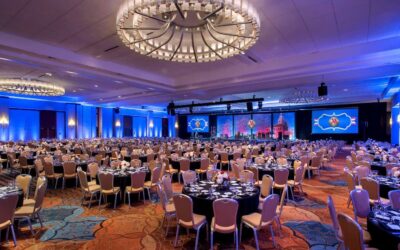There are significant differences between the generations now participating in the working world, from millennials to Gen Xers, to baby boomers. Each generation has its own ideals, expectations, proclivities, and modes of operating, and sometimes, they are at odds with one another, each thinking itself the wiser or more intelligent branch. This can make it very hard for meeting hosts and their partners in event management to cater to different groups and create an atmosphere that appeals to them all.
Even more difficult can be finding effective ways of convincing members of different generations to interact with one another, networking, and sharing ideas in creative and constructive ways. For example, you and your event company might be keen to add group gamification challenges via social media as a way to facilitate interaction in a fun and casual way. While this will likely play well with the younger, tech-savvy millennials, you can’t reasonably expect the same level of participation from baby boomers.
How, then, can you take strides to help these different groups connect in meaningful and productive ways? Here are just a few strategies to employ in the interest of improving intergenerational interaction at your meetings and events.
Gain Insight into Different Perspectives
Says Josie Rubio, Director of HR and Global Acquisition, “The place to start when encouraging intergenerational interaction is by realizing that nobody adheres to a stereotypical group dynamic 100% of the time. Individuals make up any group, and instead of ascribing broad attributes to members of a group, you need to find ways to help people connect as individuals, regardless of the generation they belong to.”
The best way to find out more about individuals attending your event is to have them provide more than just standard personal information when they sign up. Knowing whether attendees are millennials or baby boomers only paints them in broad strokes.
For example, baby boomers lived through the Vietnam War while millennials were probably deeply affected by 9/11. This tells you about a shared experience, and maybe even provides a basis for common ground, but it doesn’t tell you how individuals feel about these events or the impact to their lives.
Experienced event management professionals can help you to come up with targeted questions that provide important insights into how your event attendees see the world, how their experiences have shaped their expectations, and ultimately, what they have in common with attendees from other generations. This can provide new insights and give you the tools to plan for successful interactions between generations and individuals attending your event.
Consider the Impact of Environment
While the majority of working professionals could be considered relatively mobile and able-bodied, it’s important to understand that different environments will appeal to their sensibilities and cater to their particular needs. For example, twenty-somethings can be on their feet all day, roving exhibit halls and jetting from one activity to the next. Those in their fifties might not be as keen take on the same physical challenges.
How does this impact your ability to encourage intergenerational interaction? You’re going to have to create an environment that is exciting enough for younger attendees but also provides adequate comfort and consideration for older professionals. Where is the intersection that appeals to all groups? You and your event company will have to consider how your environment strikes a balance that helps to facilitate productive interactions.
Find Common Ground, Then Focus on Unique Contributions
Although generations are set apart in a number of ways, there are also many ways in which they are alike. There are universal commonalities that span generations, from the search for love and meaning in life to the value of financial security to the desire for work that is not only financially rewarding but also personally fulfilling.
Because all generations want these things, there is common ground for connection. However, creating a value proposition for intergenerational interaction means more than bringing people together – you also have to determine what individuals can add to the equation. You and your event management team can only do so much to bring people together and then they have to find a way to engage and share their unique experiences and perspective.
Collaborate with Event Management to Create Opportunities for Mentorship
Everyone can do at least one thing well, and often myriad things. In other words, they have something to share with others. Creating opportunities for mentorship goes beyond asking the older generation to share the wealth of their long experience with youngsters. Mentorship can go both ways.
While a baby boomer or Gen Xer could help millennials work on appropriate face-to-face interactions with coworkers and bosses, millennials could turn the tables and help older generations better understand mobile apps that add convenience and connectivity. Your event company can not only help you find ways to learn about event attendees but also to help them connect in meaningful ways and offer unique and valuable contributions.



